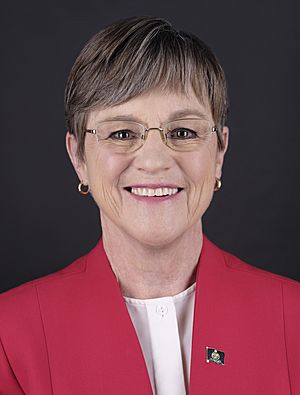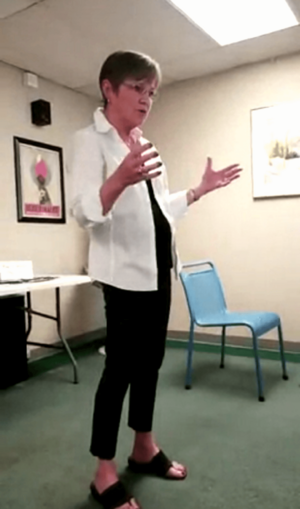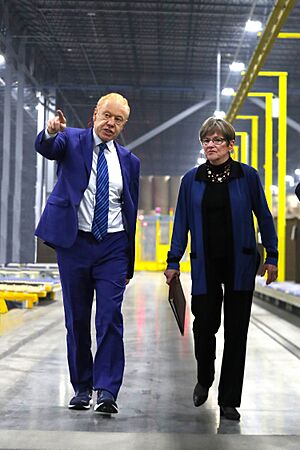Laura Kelly facts for kids
Quick facts for kids
Laura Kelly
|
|
|---|---|

Official portrait, 2018
|
|
| 48th Governor of Kansas | |
| Assumed office January 14, 2019 |
|
| Lieutenant | Lynn Rogers David Toland |
| Preceded by | Jeff Colyer |
| Member of the Kansas Senate from the 18th district |
|
| In office January 10, 2005 – January 14, 2019 |
|
| Preceded by | Dave Jackson |
| Succeeded by | Vic Miller |
| Personal details | |
| Born |
Laura Jeanne Kelly
January 24, 1950 New York City, U.S. |
| Political party | Democratic |
| Spouse |
Ted Daughety
(m. 1979; div. 2024) |
| Children | 2 |
| Residence | Cedar Crest |
| Education | Bradley University (BS) Indiana University Bloomington (MS) |
| Website | Government website |
Laura Jeanne Kelly, born on January 24, 1950, is an American politician. She has been serving as the 48th governor of Kansas since 2019. Before becoming governor, she was a member of the Democratic Party. She represented the 18th district in the Kansas Senate from 2005 to 2019. Laura Kelly was first elected governor in 2018 and was reelected in 2022.
Contents
Early Life and Education
Laura Kelly was born in New York City. Her family moved often because her father was in the military. They even lived in other countries.
She went to Bradley University in Illinois. There, she earned a Bachelor of Science degree in psychology in 1971. Later, she studied at Indiana University Bloomington. She received a Master of Science degree in therapeutic recreation. Bradley University has honored her for her achievements.
Before entering politics, Kelly worked as a recreation therapist. She helped people through activities and recreation. She was also the executive director of the Kansas Recreation and Park Association from 1988 to 2004.
Political Career
Kansas Senate Service
Laura Kelly was elected to the Kansas Senate in November 2004. She represented the northern part of Topeka. During her time in the Senate, from 2005 to 2019, she held important roles. She was often a leading member of committees. These included the Ways and Means Committee, which deals with state money.
Becoming Governor of Kansas
2018 Election
On December 15, 2017, Laura Kelly announced she would run for governor of Kansas. In the Democratic primary election, she won against other candidates. She chose State Senator Lynn Rogers as her running mate.
In the main election, Kelly ran against Republican Kris Kobach. Many people supported her, including former Kansas Governor Bill Graves. He said Laura Kelly had the qualities needed to lead the state. She won the election on November 6, 2018. She became governor on January 14, 2019, at the Kansas State Capitol.
2022 Reelection
Laura Kelly was reelected as governor on November 8, 2022. She defeated Kansas Attorney General Derek Schmidt. She began her second term on January 9, 2023.
Governor's Cabinet
The governor's cabinet is a group of leaders who help run the state. Here are some of the people in Governor Kelly's cabinet:
| Office | Incumbent |
|---|---|
| Lieutenant Governor | David Toland |
| Adjutant General | Michael Venerdi |
| Secretary of Administration | Adam Proffitt |
| Secretary of Agriculture | Mike Beam |
| Secretary of Commerce | David Toland |
| Secretary of Corrections | Jeff Zmuda |
| Secretary of Health and Environment | Janet Stanek |
| Superintendent of the Highway Patrol | Erik Smith |
| Secretary for Children and Families | Laura Howard |
| Secretary of Labor | Amber Shultz |
| Secretary of Revenue | Mark Burghardt |
| Secretary of Transportation | Calvin Reed |
| Secretary of Wildlife and Parks | Brad Loveless |
Key Political Actions
Budget and Economy
Governor Kelly has worked to improve Kansas's budget. She has criticized past budget cuts that affected schools and roads. She led efforts to balance the state budget without raising taxes.
In 2019, she stopped bills that would have cut state income taxes. She believed these cuts would create financial problems for the state. Her decisions helped Kansas have over $1 billion in cash reserves by 2020. In 2022, she signed a law to gradually remove the sales tax on food.
COVID-19 Response
During the COVID-19 pandemic in the United States, Governor Kelly took steps to protect Kansans. She declared a state of emergency in March 2020. She also closed K-12 schools for the rest of that school year. She issued a "stay at home" order to slow the virus's spread.
She also spoke about the need for more supplies like masks and testing kits. Some people criticized the vaccine rollout in Kansas. However, the state legislature also made it harder for the state to have a unified response.
Healthcare
Governor Kelly has strongly supported expanding Medicaid in Kansas. This would provide health care coverage to many more Kansans. She has proposed legislation for this in every legislative session. The current proposal is called the Healthcare Access for Working Kansans (HAWK) Act.
She also wants to improve KanCare, which is Kansas's health insurance program.
Human Services
Kelly combined two state departments to create a new Department of Human Services. This helps to better manage services for children, families, and people with disabilities.
She has also called for improvements at the Osawatomie State Hospital. This is a state psychiatric hospital. She supports funding for mental health crisis centers across Kansas.
School Funding
Governor Kelly has focused on improving funding for Kansas schools. She wants to make sure schools have enough money. She also aims to address the shortage of teachers and improve their pay. She supports expanding early childhood programs. She also wants to increase options for students going to college or other higher education.
Social Issues
One of her first actions as governor was to protect LGBT state workers. She signed an executive order to prevent job discrimination based on sexual orientation or gender identity.
Personal Life
Laura Kelly married Ted Daughety, a doctor, in 1979. They moved to Topeka in 1986. They have two adult daughters, Kathleen and Molly. Laura Kelly and Ted Daughety divorced in 2024.
She is a Catholic.
Images for kids
See also
 In Spanish: Laura Kelly para niños
In Spanish: Laura Kelly para niños
 | Jewel Prestage |
 | Ella Baker |
 | Fannie Lou Hamer |




